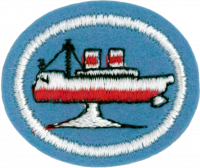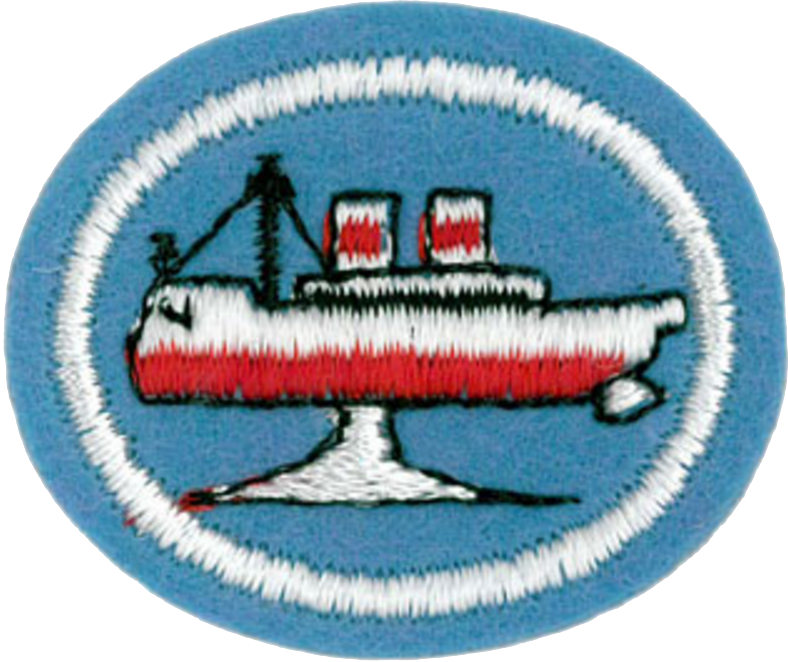Difference between revisions of "AY Honors/Model Boats/Answer Key/es"
From Pathfinder Wiki
< AY Honors | Model BoatsAY Honors/Model Boats/Answer Key/es
(Created page with "{{HonorSubpage}} <section begin="Body" /> {{ansreq|page={{#titleparts:{{PAGENAME}}|2|1}}|num=1}} <noinclude><div lang="en" dir="ltr" class="mw-content-ltr"> </noinclude> <!--...") |
(Updating to match new version of source page) |
||
| (4 intermediate revisions by one other user not shown) | |||
| Line 2: | Line 2: | ||
<section begin="Body" /> | <section begin="Body" /> | ||
{{ansreq|page={{#titleparts:{{PAGENAME}}|2|1}}|num=1}} | {{ansreq|page={{#titleparts:{{PAGENAME}}|2|1}}|num=1}} | ||
| − | <noinclude> | + | <noinclude></noinclude> |
| − | </noinclude> | + | <!-- 1. Hacer dos de los siguientes: --> |
| − | <!-- 1. | + | <noinclude></noinclude> |
| − | <noinclude | ||
| − | |||
{{ansreq|page={{#titleparts:{{PAGENAME}}|2|1}}|num=1a}} | {{ansreq|page={{#titleparts:{{PAGENAME}}|2|1}}|num=1a}} | ||
| − | <noinclude> | + | <noinclude></noinclude> |
| − | </noinclude | ||
| − | |||
| − | + | {{clear}} | |
| − | |||
| − | |||
| − | + | <noinclude></noinclude> | |
| − | <noinclude | ||
| − | |||
{{CloseReq}} <!-- 1a --> | {{CloseReq}} <!-- 1a --> | ||
{{ansreq|page={{#titleparts:{{PAGENAME}}|2|1}}|num=1b}} <!--T:3--> | {{ansreq|page={{#titleparts:{{PAGENAME}}|2|1}}|num=1b}} <!--T:3--> | ||
| − | <noinclude> | + | <noinclude></noinclude> |
| − | </noinclude | ||
| − | |||
| − | + | {{clear}} | |
| − | |||
| − | |||
| − | + | <noinclude></noinclude> | |
| − | <noinclude | ||
| − | |||
{{CloseReq}} <!-- 1b --> | {{CloseReq}} <!-- 1b --> | ||
{{ansreq|page={{#titleparts:{{PAGENAME}}|2|1}}|num=1c}} <!--T:5--> | {{ansreq|page={{#titleparts:{{PAGENAME}}|2|1}}|num=1c}} <!--T:5--> | ||
| − | <noinclude> | + | <noinclude></noinclude> |
| − | </noinclude | ||
| − | |||
| − | + | {{clear}} | |
| − | |||
| − | |||
| − | + | <noinclude></noinclude> | |
| − | <noinclude | ||
| − | |||
{{CloseReq}} <!-- 1c --> | {{CloseReq}} <!-- 1c --> | ||
{{CloseReq}} <!-- 1 --> | {{CloseReq}} <!-- 1 --> | ||
{{ansreq|page={{#titleparts:{{PAGENAME}}|2|1}}|num=2}} | {{ansreq|page={{#titleparts:{{PAGENAME}}|2|1}}|num=2}} | ||
| − | <noinclude> | + | <noinclude></noinclude> |
| − | </noinclude> | + | <!-- 2. Identificar y definir estas palabras: --> |
| − | <!-- 2. | + | <noinclude></noinclude> |
| − | <noinclude | ||
| − | |||
{{ansreq|page={{#titleparts:{{PAGENAME}}|2|1}}|num=2a}} | {{ansreq|page={{#titleparts:{{PAGENAME}}|2|1}}|num=2a}} | ||
| − | <noinclude> | + | <noinclude></noinclude> |
| − | </noinclude | ||
| − | |||
| − | |||
| − | + | <noinclude></noinclude> | |
| − | <noinclude | ||
| − | |||
{{CloseReq}} <!-- 2a --> | {{CloseReq}} <!-- 2a --> | ||
{{ansreq|page={{#titleparts:{{PAGENAME}}|2|1}}|num=2b}} <!--T:8--> | {{ansreq|page={{#titleparts:{{PAGENAME}}|2|1}}|num=2b}} <!--T:8--> | ||
| − | <noinclude> | + | <noinclude></noinclude> |
| − | </noinclude | ||
| − | |||
| − | + | {{clear}} | |
| − | |||
| − | |||
| − | + | <noinclude></noinclude> | |
| − | <noinclude | ||
| − | |||
{{CloseReq}} <!-- 2b --> | {{CloseReq}} <!-- 2b --> | ||
{{ansreq|page={{#titleparts:{{PAGENAME}}|2|1}}|num=2c}} <!--T:10--> | {{ansreq|page={{#titleparts:{{PAGENAME}}|2|1}}|num=2c}} <!--T:10--> | ||
| − | <noinclude> | + | <noinclude></noinclude> |
| − | </noinclude | ||
| − | |||
| − | |||
| − | + | <noinclude></noinclude> | |
| − | <noinclude | ||
| − | |||
{{CloseReq}} <!-- 2c --> | {{CloseReq}} <!-- 2c --> | ||
{{ansreq|page={{#titleparts:{{PAGENAME}}|2|1}}|num=2d}} <!--T:11--> | {{ansreq|page={{#titleparts:{{PAGENAME}}|2|1}}|num=2d}} <!--T:11--> | ||
| − | <noinclude> | + | <noinclude></noinclude> |
| − | </noinclude | ||
| − | |||
| − | |||
| − | + | <noinclude></noinclude> | |
| − | <noinclude | ||
| − | |||
{{CloseReq}} <!-- 2d --> | {{CloseReq}} <!-- 2d --> | ||
{{ansreq|page={{#titleparts:{{PAGENAME}}|2|1}}|num=2e}} <!--T:12--> | {{ansreq|page={{#titleparts:{{PAGENAME}}|2|1}}|num=2e}} <!--T:12--> | ||
| − | <noinclude> | + | <noinclude></noinclude> |
| − | </noinclude | ||
| − | |||
| − | |||
| − | + | <noinclude></noinclude> | |
| − | <noinclude | ||
| − | |||
{{CloseReq}} <!-- 2e --> | {{CloseReq}} <!-- 2e --> | ||
{{ansreq|page={{#titleparts:{{PAGENAME}}|2|1}}|num=2f}} <!--T:13--> | {{ansreq|page={{#titleparts:{{PAGENAME}}|2|1}}|num=2f}} <!--T:13--> | ||
| − | <noinclude> | + | <noinclude></noinclude> |
| − | </noinclude | ||
| − | |||
| − | |||
| − | + | {{clear}} | |
| − | |||
| − | |||
| − | |||
| − | |||
{{clear}} | {{clear}} | ||
| − | |||
| − | + | <noinclude></noinclude> | |
| − | <noinclude | ||
| − | |||
{{CloseReq}} <!-- 2f --> | {{CloseReq}} <!-- 2f --> | ||
{{ansreq|page={{#titleparts:{{PAGENAME}}|2|1}}|num=2g}} <!--T:16--> | {{ansreq|page={{#titleparts:{{PAGENAME}}|2|1}}|num=2g}} <!--T:16--> | ||
| − | <noinclude> | + | <noinclude></noinclude> |
| − | </noinclude | ||
| − | |||
| − | |||
| − | + | <noinclude></noinclude> | |
| − | <noinclude | ||
| − | |||
{{CloseReq}} <!-- 2g --> | {{CloseReq}} <!-- 2g --> | ||
{{ansreq|page={{#titleparts:{{PAGENAME}}|2|1}}|num=2h}} <!--T:17--> | {{ansreq|page={{#titleparts:{{PAGENAME}}|2|1}}|num=2h}} <!--T:17--> | ||
| − | <noinclude> | + | <noinclude></noinclude> |
| − | </noinclude | ||
| − | |||
| − | + | {{clear}} | |
| − | |||
| − | |||
| − | + | <noinclude></noinclude> | |
| − | <noinclude | ||
| − | |||
{{CloseReq}} <!-- 2h --> | {{CloseReq}} <!-- 2h --> | ||
{{ansreq|page={{#titleparts:{{PAGENAME}}|2|1}}|num=2i}} <!--T:19--> | {{ansreq|page={{#titleparts:{{PAGENAME}}|2|1}}|num=2i}} <!--T:19--> | ||
| − | <noinclude> | + | <noinclude></noinclude> |
| − | </noinclude | ||
| − | |||
| − | |||
| − | + | <noinclude></noinclude> | |
| − | <noinclude | ||
| − | |||
{{CloseReq}} <!-- 2i --> | {{CloseReq}} <!-- 2i --> | ||
{{ansreq|page={{#titleparts:{{PAGENAME}}|2|1}}|num=2j}} <!--T:20--> | {{ansreq|page={{#titleparts:{{PAGENAME}}|2|1}}|num=2j}} <!--T:20--> | ||
| − | <noinclude> | + | <noinclude></noinclude> |
| − | </noinclude | ||
| − | |||
| − | |||
| − | + | <noinclude></noinclude> | |
| − | <noinclude | ||
| − | |||
{{CloseReq}} <!-- 2j --> | {{CloseReq}} <!-- 2j --> | ||
{{ansreq|page={{#titleparts:{{PAGENAME}}|2|1}}|num=2k}} <!--T:21--> | {{ansreq|page={{#titleparts:{{PAGENAME}}|2|1}}|num=2k}} <!--T:21--> | ||
| − | <noinclude> | + | <noinclude></noinclude> |
| − | </noinclude | ||
| − | |||
| − | |||
| − | + | {{clear}} | |
| − | |||
| − | |||
| − | + | <noinclude></noinclude> | |
| − | <noinclude | ||
| − | |||
{{CloseReq}} <!-- 2k --> | {{CloseReq}} <!-- 2k --> | ||
{{ansreq|page={{#titleparts:{{PAGENAME}}|2|1}}|num=2l}} <!--T:23--> | {{ansreq|page={{#titleparts:{{PAGENAME}}|2|1}}|num=2l}} <!--T:23--> | ||
| − | <noinclude> | + | <noinclude></noinclude> |
| − | </noinclude | ||
| − | |||
| − | + | {{clear}} | |
| − | |||
| − | |||
| − | + | <noinclude></noinclude> | |
| − | <noinclude | ||
| − | |||
{{CloseReq}} <!-- 2l --> | {{CloseReq}} <!-- 2l --> | ||
{{ansreq|page={{#titleparts:{{PAGENAME}}|2|1}}|num=2m}} <!--T:25--> | {{ansreq|page={{#titleparts:{{PAGENAME}}|2|1}}|num=2m}} <!--T:25--> | ||
| − | <noinclude> | + | <noinclude></noinclude> |
| − | </noinclude | ||
| − | |||
| − | + | {{clear}} | |
| − | |||
| − | |||
| − | + | <noinclude></noinclude> | |
| − | <noinclude | ||
| − | |||
{{CloseReq}} <!-- 2m --> | {{CloseReq}} <!-- 2m --> | ||
{{CloseReq}} <!-- 2 --> | {{CloseReq}} <!-- 2 --> | ||
| − | <noinclude> | + | <noinclude></noinclude> |
| − | </noinclude> | + | ==Referencias== |
| − | == | + | <noinclude></noinclude> |
| − | |||
| − | |||
| − | |||
| − | <noinclude | ||
| − | |||
| − | |||
{{CloseHonorPage}} | {{CloseHonorPage}} | ||
Latest revision as of 16:11, 14 July 2022
Botemodelismo
Nivel de destreza
2
Año
1991
Version
05.02.2026
Autoridad de aprobación
Asociación General
1
Hacer dos de los siguientes:
1a
Comprar y construir un kit para un velero de 10 a 15 pulgadas (25 a 38 cm) de largo y unos 4 a 5 pulgadas (10 a 13 cm) de ancho y operar el barco en agua, por lo menos durante dos minutos.
1b
Construir un modelo de barco con un motor eléctrico de sus propios planos o de un modelo comprado tamaño 10 a 18 pulgadas (25 a 46 cm) y operar el barco durante tres a cinco minutos.
1c
Construir un modelo de barco de 18 a 30 pulgadas (46 a 76 cm) de largo de sus propios planos o de un modelo comprado. Instalar un peuqeño motor de combustión interna de .029 o .049 y operar durante un mínimo de dos exitosas series de tres a cinco minutos. Llevar un registro por escrito de las características de funcionamiento del modelo y especifica lo que se hizo para mejorar su rendimiento.
2
Identificar y definir estas palabras:
2a
2b
Centro de gravedad
2c
Hélice
2d
Empuje y ascenso
2e
Mono casco
2f
Hidro
2g
Proa / Bulbo de Proa
2h
Quilla
2i
Espejo
2j
Cavitación
2k
Escora
2l
Planeación
2m
Arrastre


